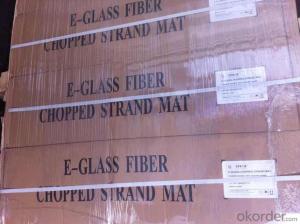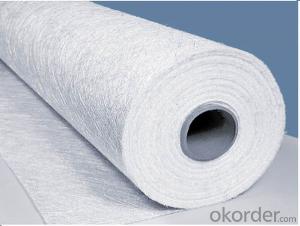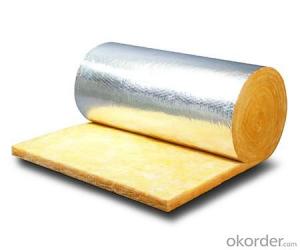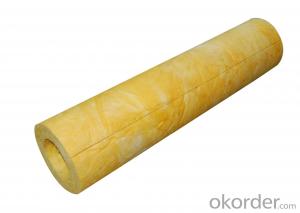E-glass Chopped Strand Mat 600gsm
- Loading Port:
- China Main Port
- Payment Terms:
- TT or LC
- Min Order Qty:
- 20000 kg
- Supply Capability:
- -
OKorder Service Pledge
OKorder Financial Service
You Might Also Like
1.Product Description
E-glass CSM 600gsm is made of randomly dispersed strands with power or emulsion bonded.
Applicable for hand lay-up ,continuous lamination process. Compatible with UP,VE.
Suitable for transparent panels,ship bodies,automobile parts and interior decorations ,etc.
Consistent thickness and stiffness.
Rapid impregnating and good compatibility with resin.
Superior wet through with less air trap.
Good mechanical properties and high strength of parts.
3.Technical Data Sheet
| Various Tests | ACCEPTED STANDARDS | TEST RESULTS | ||
| Conducted | Standard No. | Standard Value | Average Value | Passed ? / Yes or No |
| Mass per Unit Area | ISO 3374 — 2000 | 555-645 | 608 | Yes |
| (g/m2) | ||||
| Breakage Strengh | ISO 3342— 1995 | ≥160 | 328.00 | Yes |
| (N) | ||||
| Moisture Content | ISO 3344 — 1997 | ≤0.20 | 0.10 | Yes |
| (%) | ||||
| Loss on Ignition | ISO 1887 — 1995 | 2.42-4.59 | 3.13 | Yes |
| (%) | ||||
Packaging&Storage
Eech roll is packed by polyester bag,and then put into a cardboard box or plastic wowen bag.The weight of each roll is between 20 to 85 Kg, The rolls are to be horizontally placed and could be in bulk or on pallet.Optimum storage conditions are between the temperature of 5~35℃ and with the humidity between 35%~65%.The product should be used within 12 months from the time of delivery and remain in theiroriginal packaging until just prior to use.
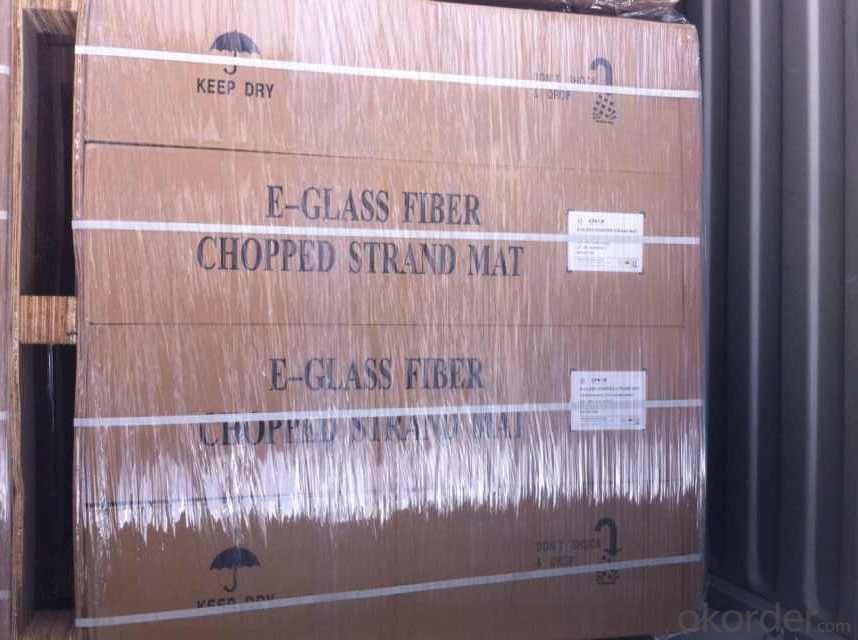
- Q:Can fiberglass mat tissue be used for electrical transformers?
- Fiberglass mat tissue can be used for electrical transformers. It is commonly used as insulation material in transformer manufacturing due to its excellent electrical insulation properties. Fiberglass mat tissue is made of fine glass fibers bonded together with a resin, creating a strong and durable material. It is able to withstand high temperatures and has a high dielectric strength, making it suitable for use in electrical transformers. Additionally, fiberglass mat tissue is lightweight and flexible, allowing for easy handling and installation in transformer components. It is also resistant to moisture, chemicals, and fire, further enhancing its suitability for transformer applications. Overall, fiberglass mat tissue is a reliable and efficient choice for insulation in electrical transformers.
- Q:How does fiberglass mat tissue perform in terms of mold and mildew resistance?
- Fiberglass mat tissue possesses exceptional mold and mildew resistance. Its inherent moisture resistance prevents the proliferation of mold and mildew. Moreover, fiberglass is impermeable and unsuitable for the flourishing of these microorganisms. Furthermore, fiberglass mat tissue finds extensive usage in areas with high humidity, like bathroom walls or showers, and has proven highly efficient in deterring mold and mildew growth. All in all, fiberglass mat tissue exhibits outstanding performance in terms of mold and mildew resistance, rendering it a dependable option for situations where these issues are prominent.
- Q:Can fiberglass mat tissue be used for insulation in hot climates?
- Yes, fiberglass mat tissue can be used for insulation in hot climates. It has excellent thermal insulation properties and can effectively block heat transfer, making it suitable for use in hot climates to maintain cooler indoor temperatures.
- Q:Is fiberglass mat tissue resistant to chemicals?
- Yes, fiberglass mat tissue is generally resistant to chemicals. The composition of fiberglass mat tissue, which consists of fine glass fibers bonded together with a resin, provides it with excellent chemical resistance properties. This resistance allows the fiberglass mat tissue to withstand exposure to a wide range of chemicals without deteriorating or losing its structural integrity. However, it is important to note that the specific chemical resistance of fiberglass mat tissue may vary depending on the type and concentration of the chemical it comes into contact with. Therefore, it is always advisable to consult the manufacturer's guidelines or conduct appropriate testing to ensure compatibility with specific chemicals.
- Q:What are the potential limitations of using fiberglass mat tissue?
- There are several potential limitations of using fiberglass mat tissue. Firstly, fiberglass mat tissue is relatively brittle compared to other materials. This means that it may be prone to cracking or breaking under certain conditions, especially if it is subjected to high levels of stress or impact. This can limit its use in applications where durability and flexibility are important. Secondly, fiberglass mat tissue is not inherently resistant to moisture. If exposed to water or high humidity for extended periods of time, it may absorb moisture and lose its structural integrity. This can make it unsuitable for use in environments where moisture resistance is a critical requirement. Additionally, fiberglass mat tissue can be challenging to work with due to its sharp edges and fibers. Special precautions, such as wearing protective clothing and using proper handling techniques, are necessary to avoid injury. This can increase the complexity and cost of using fiberglass mat tissue in certain applications. Furthermore, fiberglass mat tissue may release fine particles or fibers into the air when cut or manipulated. These particles can pose health risks if inhaled, potentially leading to respiratory issues or irritation. Proper safety measures, such as using masks and adequate ventilation, must be taken to minimize these risks. Lastly, fiberglass mat tissue is a relatively expensive material compared to some alternatives. Its production process involves multiple steps and specialized equipment, which can contribute to higher costs. This can limit its use in applications where cost-effectiveness is a primary consideration. Overall, while fiberglass mat tissue offers various advantages in terms of strength, insulation, and fire resistance, its potential limitations should be carefully considered before selecting it for a specific application.
- Q:Can fiberglass mat tissue be used for composite pipe manufacturing?
- Yes, fiberglass mat tissue can be used for composite pipe manufacturing. Fiberglass mat tissue is a type of reinforcement material that is commonly used in the production of composite pipes. It provides strength and durability to the pipes, making them suitable for various applications. The fiberglass mat tissue is typically impregnated with a resin, such as polyester or epoxy, which helps to bind the fibers together and create a solid structure. This reinforcement material is known for its lightweight properties and excellent corrosion resistance, making it an ideal choice for composite pipe manufacturing. Additionally, fiberglass mat tissue can be easily molded into different shapes and sizes, allowing for the production of pipes with varying diameters and lengths. Overall, the use of fiberglass mat tissue in composite pipe manufacturing offers numerous advantages, including enhanced strength, durability, and resistance to harsh environmental conditions.
- Q:What are the advantages of using fiberglass mat tissue in construction?
- Using fiberglass mat tissue in construction offers several advantages. Firstly, it provides excellent reinforcement and strength to construction materials, enhancing their durability and resistance to cracks, impacts, and weathering. This makes it an ideal choice for reinforcing concrete, roofing materials, and composite products. Secondly, fiberglass mat tissue is lightweight and easy to handle, making it convenient for construction purposes. Unlike heavy steel reinforcements, it can be easily cut, shaped, and applied without requiring specialized tools. This saves both labor and time, resulting in cost savings. Additionally, fiberglass mat tissue is non-corrosive and non-conductive, making it suitable for various environments. It remains unaffected by rust or degradation, even in harsh conditions, ensuring the longevity and reliability of the construction. Moreover, it does not conduct electricity, which is crucial for applications where electrical conductivity must be avoided. Furthermore, fiberglass mat tissue offers excellent thermal insulation properties. It acts as a barrier to heat transfer, creating a comfortable and energy-efficient interior environment. This can lead to reduced heating and cooling costs, making it a sustainable and cost-effective choice. Lastly, fiberglass mat tissue is resistant to fire and chemicals. It does not burn or release toxic fumes when exposed to flames, providing an added level of safety in construction. It also withstands many chemicals, including acids and alkalis, making it suitable for corrosive environments such as chemical plants or industrial facilities. In conclusion, the benefits of using fiberglass mat tissue in construction include enhanced reinforcement, lightweight and easy handling, non-corrosive and non-conductive properties, thermal insulation, fire resistance, and chemical resistance. These advantages make it a versatile and reliable material for various construction applications.
- Q:Does fiberglass mat tissue require any special precautions during handling?
- Special precautions are necessary when handling fiberglass mat tissue. This type of tissue comprises minuscule glass fibers that can cause irritation to the skin, eyes, and respiratory system if not handled properly. To reduce the risk of direct contact with the skin and eyes, it is imperative to wear protective clothing, including gloves, long sleeves, and goggles. Furthermore, working in a well-ventilated area or utilizing a respirator is highly recommended to prevent the inhalation of airborne fiberglass particles. To avoid the creation of additional airborne particles, it is advisable to handle the fiberglass mat tissue delicately. By implementing these precautions, the potential health risks associated with handling fiberglass mat tissue can be minimized.
- Q:Is fiberglass mat tissue compatible with different types of resins?
- Yes, fiberglass mat tissue is compatible with different types of resins. It is commonly used in the construction industry as a reinforcement material for various resin systems, including polyester, epoxy, and vinyl ester resins. The compatibility of fiberglass mat tissue with different resins makes it versatile and suitable for a wide range of applications.
- Q:Is fiberglass mat tissue resistant to mildew and rot?
- Yes, fiberglass mat tissue is resistant to mildew and rot. Fiberglass is made from fine glass fibers that are woven together to create a strong and durable material. These fibers are non-porous and do not absorb moisture, making fiberglass mat tissue highly resistant to the growth of mildew and the decomposition caused by rot. Additionally, fiberglass is often coated with protective finishes or treated with additives that further enhance its resistance to these types of biological degradation. This makes fiberglass mat tissue an excellent choice for applications where moisture or humidity is a concern, such as in bathrooms, outdoor structures, or areas prone to high humidity.
1. Manufacturer Overview |
|
|---|---|
| Location | |
| Year Established | |
| Annual Output Value | |
| Main Markets | |
| Company Certifications | |
2. Manufacturer Certificates |
|
|---|---|
| a) Certification Name | |
| Range | |
| Reference | |
| Validity Period | |
3. Manufacturer Capability |
|
|---|---|
| a)Trade Capacity | |
| Nearest Port | |
| Export Percentage | |
| No.of Employees in Trade Department | |
| Language Spoken: | |
| b)Factory Information | |
| Factory Size: | |
| No. of Production Lines | |
| Contract Manufacturing | |
| Product Price Range | |
Send your message to us
E-glass Chopped Strand Mat 600gsm
- Loading Port:
- China Main Port
- Payment Terms:
- TT or LC
- Min Order Qty:
- 20000 kg
- Supply Capability:
- -
OKorder Service Pledge
OKorder Financial Service
Similar products
New products
Hot products
Hot Searches
Related keywords

